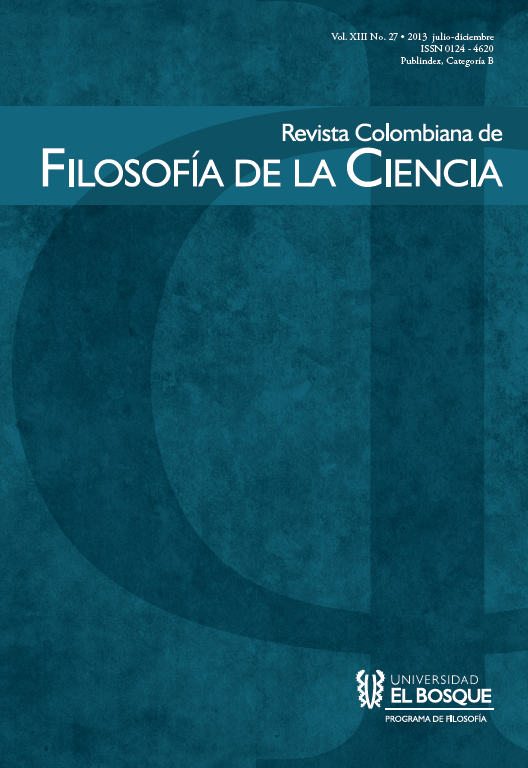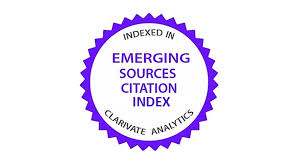FODOR Y KIM EN TORNO A LA POSIBILIDAD DE LAS CIENCIAS ESPECIALES, LA REALIZABILIDAD MÚLTIPLE Y EL REDUCCIONISMO
DOI:
https://doi.org/10.18270/rcfc.v13i27.1631Resumen
El argumento crucial que se supone refuta al reduccionismo de una vez y para siempre es la
idea de la realizabilidad múltiple (RM) de las propiedades superiores o no físicas. Al introducir
y desarrollar esta idea, autores como Putnam y Fodor reafirmaron filosóficamente
el estatus de las ciencias especiales como ciencias autónomas con pretensiones explicativas
nomológicas. En total oposición, Kim construye un argumento bastante peculiar que
toma a la RM como premisa para concluir en la reducción de las ciencias especiales. En
la primera parte del artículo, analizo el razonamiento de Kim y muestro su fundamental
dependencia del así llamado principio de herencia causal, que sostiene que los poderes
causales superiores, como los mentales, se derivan de los poderes causales físicos al ser
realizados por estos y supervenirlos. En la segunda, examino la respuesta de Fodor en
tanto realizadores que se encuentran en mundos metafísicamente posibles distintos al
nuestro. En la tercera, arguyo que la RM no es suficiente para mantener una posición
antirreduccionista y que debemos adicionar el rechazo del principio de herencia causal de
Kim, rechazo que tendrá que ser articulado en términos de una causalidad descendente.
Descargas
Referencias bibliográficas
Bennett, Karen. “Exclusion Again”. Being Reduced: New Essays on Reduction,
Explanation, and Causation. Eds. Jesper Kallestrup y Jakob Hohwy. Nueva
York: Oxford University Press, 2008.
Bickle, John. Psychoneural Reduction: The New Wave. Cambridge, MA: MIT
Press, 1998.
Campbell, Donald. “Downward Causation in Hierarchically Organized
Biological systems”. Studies in the Philosophy of Biology. Reduction and
Related Problems. Eds. F. J. Ayala y T. Dobzhansky. Berkeley: University of
California Press, 1974.
Crane, Tim. “The Significance of Emergence”. Physicalism and its Discontents.
Eds. Carl Gillett y Barry Loewer. Cambridge University Press, 2001.
Enç, Berent. "In Defense of the Identity Theory". Journal of Philosophy 80
(1983): 279-98.
Fodor, Jerry. “Special Sciences (Or: The Disunity of Science as a Working
Hypothesis)”. 1974. Emergence: Contemporary Readings in Philosophy and Science. Eds. M. Bedau y P. Humphreys. Massachusetts Institute of Technology,
—, “Making Mind Matter More”. A Theory of Content and Other Essays.
Cambridge: The MIT Press, 1990. 137-159.
—, “Special Sciences: Still Autonomous After all These Years”. Noûs 31
(2000): 149-63.
Gillett, Carl. “The Dimensions of Realization: A Critique of the Standard
View”. Analysis 62 (2002): 316-23.
Hüttemann, Andreas y David Papineau. “Physicalism Decomposed”. Analysis
1 (2005): 33-9.
Juarrero, Alicia. Dynamics in Action. Intentional Behavior as a Complex System.
Cambridge: Massachusets Institute of Technology, 1999.
Kim, Jaegwon. “The Myth of Nonreductive Materialism”. Proceedings and
Addresses of the American Philosophical Association 63.3 (1989): 31-47.
—,“Multiple Realization and the Metaphysics of Reduction”. Philosophy and
Phenomenological Research 52.1 (1992): 1-26.
—, “The Nonreductivist’s Troubles with Mental Causation”. Supervenience
and Mind. Selected Philosophical Essays. Nueva York: Cambridge University
Press, 1993. 336-57.
—, “Supervenience”. A Companion to the Philosophy of Mind. Ed. S. Guttenplan.
Cambridge, Massachusetts: Blackwell Publishers, 1994. 575-83.
LePore, E. & Loewer, B. “More on Making Mind Matter”. Philosophical
Topics 17 (1989): 175-92.
Lewis, David. “Mad Pain and Martian Pain”. Readings in Philosophy of Psychology.
Ed. Ned Block. Cambridge, MA: Harvard University Press, 1980. 216-22.
Mackie, John Leslie. Truth, Probability and Paradox. Oxford: Oxford University
Press, 1973.
McLaughlin, Brian. “Is Role-Functionalism Committed to Epiphenomenalism?”
Journal of Consciousness Studies 13 (2006): 39-66.
Morales, J. D. “Causalidad, mente y emergencia: causalidad mental como
causalidad descendente”. Saga 24 (2012).
Papineau, David. “Arguments for Supervenience and Physical Realization”.
Supervenience: New Essays. Eds. E. Savellos y U. Yalcin. Cambridge:
Cambridge University Press, 1995. 226-43.
—, “Must a Physicalist be a Microphysicalist?” Being Reduced: New Essays
on Reduction, Explanation, and Causation. Eds. Jesper Kallestrup y Jakob
Hohwy. Nueva York: Oxford University Press, 2008.
Putnam, Hilary. “On Properties”. Essays in Honor of Carl G. Hempel. Eds. N.
Rescher, et al. Dordrecht, Holland: D. Reidel, 1970.
Shoemaker, Sydney. Physical Realization. Nueva York: Oxford University
Press, 2007.
Stoljar, Daniel. “Distinctions in Distinction”. Being Reduced: New Essays on
Reduction, Explanation, and Causation. Eds. Jesper Kallestrup y Jakob
Hohwy. Nueva York: Oxford University Press, 2008.
Van Gulick, Robert. “Who’s in Charge Here? And Who’s Doing All the
Work?” Mental Causation. Eds. J. Heil y A. Mele. Oxford: Clarendon
Press, 1993.
Descargas
Publicado
Cómo citar
Número
Sección

| Estadísticas de artículo | |
|---|---|
| Vistas de resúmenes | |
| Vistas de PDF | |
| Descargas de PDF | |
| Vistas de HTML | |
| Otras vistas | |











